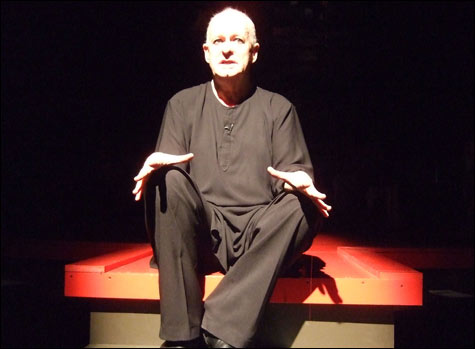
ELECTIONS & ERECTIONS: Pieter-Dirk Uys takes the piss out of both the ANC and the GOP. |
“A patriot is someone who protects his country from its government,” remarks Pieter-Dirk Uys, briefly returning to the stage after taking his curtain call in the glittering, gray-coiffed guise of his female Afrikaner alter ego, Mrs. Evita Bezuidenhout, the self-proclaimed “most famous white woman in South Africa.” If so, the South African satirist is a patriot both resident and visiting, finding time in his latest one-man show, Elections & Erections: A Chronicle of Fear and Fun (at Zero Arrow Theatre through May 4), to take the piss out of both the ANC and the GOP. The American Repertory Theatre inaugurated its Zero Arrow playing space in 2005 with Uys’s first Cambridge appearance, in Foreign AIDS. Now the puckish performer, for decades a thorn in the side of the apartheid government, is back, again proving he can stick it to Thabo Mbeki, whose irresponsiveness to the AIDS pandemic particularly infuriates him, with as merry a passion as he did P.W. Botha. Indeed, Uys credits officialdom past and present as his scriptwriters: “I don’t pay taxes, I pay royalties.”
Uys’s new show, he has said, takes its title from two things that were illegal when the now-63-year-old gay white man was growing up in South Africa: democracy and sex. A fan of both, Uys nonetheless makes it clear that it was erotic rather than political passion that turned him into a democrat, recounting the harrowing, sometimes humbling youthful sexual encounters, many across racial lines, that initially filled the young man with the Calvinist upbringing with terror of jail and Hell. Uys admits that as a white man with some connections, he was at less risk than many of his partners. “But if you ask about the fun I have had with illegal new friends in the dark,” he says, “I can tell you about fear.” It is an uncharacteristically fierce and straightforward moment in a show that often masks its dead-seriousness in drag-queen silliness.

Although her image looms over the Zero Arrow stage and she gets the last spot on the bill, Mrs. Bezuidenhout is not Elections & Erections’ most memorable persona. As Pat Paulsen and Al Franken have done in the US, Uys’s alter ego, however non-existent, is running for the South African presidency in 2009. (And since Mbeki is prevented from a third term and his likely successor, Jacob Zuma, is awaiting trial for corruption, she may have a chance.) The various references to Bezuidenhout’s candidacy include the assertion that good friend Hillary Clinton got the idea from her. But for all her Dame Edna Everage glamor, Tannie Evita is eclipsed by Uys’s turns as, among others, Desmond Tutu and Nelson Mandela (in which impersonations he is broad yet uncanny), Winnie Mandela, Mother Teresa (manning the phone lines in heaven), Bill Clinton (whose smirk he perfectly emulates), and “Jewish-African princess” Mrs. Nowell Fine, who, despite her advanced years and the rigors of her toilette, has found the time and heart to adopt a “black AIDS orphan baby” — for the handling of whom she keeps a pair of rubber gloves on her make-up table, along with the lip liner and mascara.
Not all of Uys’s material translates, though his love of the homeland whose hand he bites comes through loud and clear. So does his anger, among the chief targets of which are AIDS-ignorant Minister of Health Manto Tshabalala-Msimang, whose liver transplant Uys chalks up to drink, and Zimbabwean first lady Grace Mugabe, whose selfishness takes the form of a land-grab variation on “Old McDonald Had a Farm.” A master clown, the self-effacing Uys manages to be lovable even when his material is scathing. In his own guise (balding, a bit thick, in black tunic, pants, and eyeliner), the performer urges us to approach the upcoming election in a state of arousal rather apathy. Elections & Erections, too, is worth getting it up for.
Noël Coward had already made hay of spatting exes in Private Lives. But in that 1930 success, the sparking, feuding former spouses were both alive and kicking. By the time the scribbler with “just a talent to amuse” applied that lissome gift to Blithe Spirit, it took not just coinciding honeymoons but a full-out séance to bring a sundered couple back together — and once again there was the complication of the second spouse. First presented in 1941, when most of England needed a laugh, Blithe Spirit has little more substance than the “protoplasmic manifestations” among its characters, and its conjuration gimmick does grow thin when stretched over three acts. But for most of its duration, Coward’s romantic farce set at a revolving door to the Great Beyond is sheer delight. And so is the quick, crisp Trinity Repertory Company revival (through April 27), which races through Coward’s cocktail-era mix of drollery and pyrotechnics with only a single intermission to catch its breath.